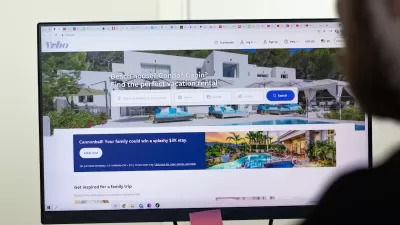Does apartment-sharing reduce regional housing supply? Probably not very much.

Over the past few years, the growth of Airbnb.com has made it much easier for people to rent out rooms in their houses and apartments. Before Airbnb, a traveler who wanted an alternative to hotels (which tend to be (a) quite expensive or (b) located in desolate-looking suburban arterials), would most easily be able to find a room through a temporary listing on Craigslist. However, these travelers had no way of knowing anything about their hosts, and would-be hosts had no way of knowing anything about their renters. By contrast, Airbnb, by providing a forum for hosts to review guests and vice versa, does allow some screening to take place.*
However, Airbnb has become politically controversial in high-priced, regulation-obsessed cities like Los Angeles and New York. Hotels and hotel unions quite understandably see Airbnb as competition in the short-term lodging industry, and wish to regulate it intensively (if not to destroy it). One common anti-Airbnb argument** is that Airbnb, by making short-term lodging more affordable, actually reduces the supply of traditional apartments—that is, apartments leased for a month or more at a time). The argument runs as follows: units that are on Airbnb for a few days at a time would, in the absence of Airbnb, be rented out as traditional apartments. Thus, Airbnb reduces the housing supply and raises rents.
This argument rests on an essentially unprovable claim: that Airbnb units would otherwise be rented out as traditional apartments. More importantly, the argument proves too much. If Airbnb hosts reduce the supply of apartments by not using their houses and spare rooms as traditional apartments, why isn't this equally true of hotels who are not using their rooms as apartments, or homeowners who are not renting out every spare room? And if homeowners and hotels are reducing the rental housing supply, why shoudn’t they be forced to rent out their units as traditional apartments?
Finally, the argument rests on the assumption that Airbnb includes a significant share of the rental housing market. For example, LAANE (a union-affiliated policy organization based in Los Angeles) recently issued a report claiming that Airbnb takes ,7316 units off the Los Angeles rental market, which “is equivalent to seven years of affordable housing construction inLos Angeles." But since Los Angeles produces very little "affordable housing" (whatever that term means) this statistic proves nothing.
A better way of understanding Airbnb’s impact, if any, on rents is to compare it to the total number of housing units in Los Angeles. There are just over 1.2 million housing units in the city of Los Angeles; thus, Airbnb units are roughly 0.6 percent of the housing market. There are about 700,000 rental units in Los Angeles—so even if every single Airbnb unit would otherwise be part of the rental market, Airbnb units would comprise only 1 percent of the rental market. (I very much doubt that this is the case, if only because since some Airbnb units are in privately owned homes and not every part-time Airbnb landlord wants a permanent roommate). Thus, it seems to me that even if every single Airbnb unit would be used as traditional apartments in the absence of Airbnb, its impact on regional housing markets would be small.
*Though perhaps not much: since the reviews are not anonymous, a host who reviews guests critically (or a guest who reviews hosts critically) may get negative reviews and less business in the future.
**This essay focuses on the relationship of Airbnb and affordable housing; however, I note that Airbnb does raise a variety of other legal and policy concerns unrelated to this little essay.

Manufactured Crisis: Losing the Nation’s Largest Source of Unsubsidized Affordable Housing
Manufactured housing communities have long been an affordable housing option for millions of people living in the U.S., but that affordability is disappearing rapidly. How did we get here?

Americans May Be Stuck — But Why?
Americans are moving a lot less than they once did, and that is a problem. While Yoni Applebaum, in his highly-publicized article Stuck, gets the reasons badly wrong, it's still important to ask: why are we moving so much less than before?

Using Old Oil and Gas Wells for Green Energy Storage
Penn State researchers have found that repurposing abandoned oil and gas wells for geothermal-assisted compressed-air energy storage can boost efficiency, reduce environmental risks, and support clean energy and job transitions.

Greening Oakland’s School Grounds
With help from community partners like the Trust for Public Land, Oakland Unified School District is turning barren, asphalt-covered schoolyards into vibrant, green spaces that support outdoor learning, play, and student well-being.

California Governor Suspends CEQA Reviews for Utilities in Fire Areas
Utility restoration efforts in areas affected by the January wildfires in Los Angeles will be exempt from environmental regulations to speed up the rebuilding of essential infrastructure.

Native American Communities Prepare to Lead on Environmental Stewardship
In the face of federal threats to public lands and conservation efforts, indigenous groups continue to model nature-centered conservation efforts.
Urban Design for Planners 1: Software Tools
This six-course series explores essential urban design concepts using open source software and equips planners with the tools they need to participate fully in the urban design process.
Planning for Universal Design
Learn the tools for implementing Universal Design in planning regulations.
Heyer Gruel & Associates PA
City of Moreno Valley
Institute for Housing and Urban Development Studies (IHS)
City of Grandview
Harvard GSD Executive Education
Salt Lake City
NYU Wagner Graduate School of Public Service
City of Cambridge, Maryland






























